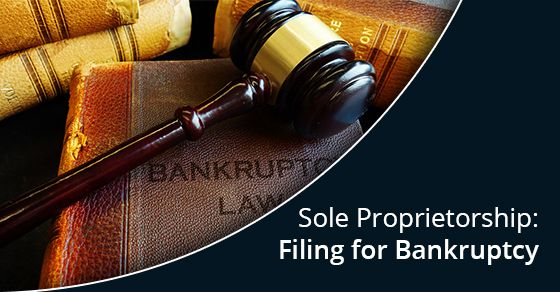
Sole Proprietorship: Filing for Bankruptcy
Being your own boss brings about freedoms you would otherwise forfeit when working for somebody else. But despite this autonomy, owning your own business certainly comes with its unique set of challenges — financial security being one of them. Despite our best efforts, there are times when some business endeavours do not go according to plan. Your sales numbers may not be what you expected, or the economy may have taken a turn for the worse. Whatever the case, many business owners who face hardships may end up in financial debt.
Sometimes, the only way to get out of this difficult situation is to file for bankruptcy. It is a chance for an honest business owner to legally climb out of insurmountable debt while being fair to his or her creditors. What many people do not realize, however, is that bankruptcy guidelines are different for those who own a sole proprietorship. If your business is structured in this way, let’s explore how these rules can affect you.
What is a sole proprietorship?
Before examining your bankruptcy options, it’s important to understand what a sole proprietorship actually means. A sole proprietorship is a one-owner business. The business is not incorporated nor is it structured as a limited liability company, also known as an LLC. Whether you’ve started a restaurant or a health spa, if that operation is not formally set up as a partnership, a corporation, or LLC, you have a sole proprietorship.
What does this mean when filing for bankruptcy?
Although you may view your business and your personal self as two separate entities, this is not the case under the law. With a sole proprietorship, there is no separation. If you owe money to business partners or commercial creditors, they can sue you and take your personal assets to satisfy the debt. These assets can include your family home, your car, and the savings you have in your personal banking account.
Here’s the bottom line: Your business is not its own separate entity, so it cannot declare its own bankruptcy the way a corporation could. This means the owner must file for personal bankruptcy to get rid of business-related debt.
What does bankruptcy entail?
Declaring bankruptcy means you are giving up everything you own to a licensed insolvency trustee in exchange for the elimination of your business debts. You are ultimately given a chance to start over. Once the bankruptcy is filed, there is an immediate “stay of proceedings”. Unsecured creditors cannot continue their lawsuits, garnish your wages, or even contact you with requests for payment.
Although it may appear as though the slate has been wiped clean, it’s important to note the following:
- Your credit will be affected
A note about your bankruptcy claim will appear on your credit report and remain there for the next six years. This means it will be more difficult to get a loan, should you try to start a new business or make a large investment in the near future.
- You will have mandated duties
You will be required to perform certain duties as a bankrupt sole proprietorship. These duties may include sending the trustee proof of your income each month and attending credit counselling sessions to learn money management skills.
Every bankruptcy file has its own unique circumstances. There are some common indicators as to whether a bankruptcy option is right for you. If your business’ poor income performance means there’s no money to pay off debt, then you may want to consider this route. Many owners will turn to their bank for financial assistance. But sometimes bankruptcy may be the only way out if you’ve reached the absolute maximum borrowing limit.
How can a licensed insolvency trustee help?
By law, you must work with a licensed insolvency trustee like Charles Advisory Services to file for bankruptcy. This person is licensed by the Superintendent of Bankruptcy to administer bankruptcies and manage assets held in trust. If you’re tempted to work with a debt consultant instead, be aware it will cost you more. This is because debt consultancy is a private industry, whereas trustee fees are regulated by the government.
If you are considering bankruptcy, consumer proposals, credit management or debt consolidation are just some of the other avenues to explore. As the owner of a sole proprietorship, you should never feel as though you must navigate these difficult circumstances alone.
For more information on filing for bankruptcy, please call Charles Advisory Services at 416-486-9660 or contact us here.

Leave A Comment